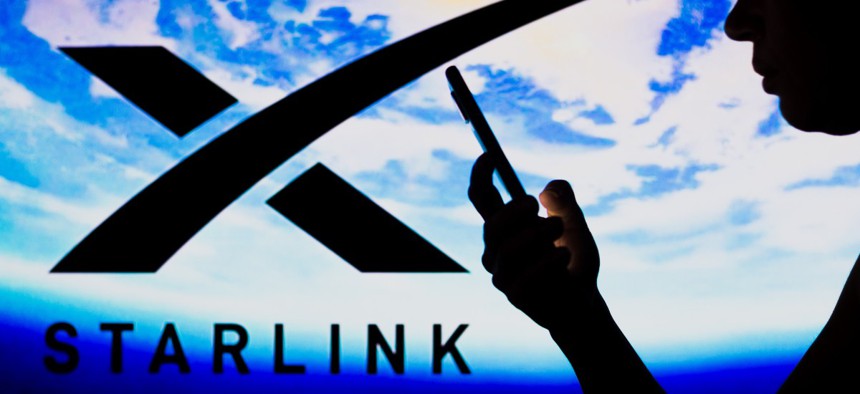SpaceX’s Starlink Petitions 'Grossly Unfair' Denial of $885M in Broadband Funding

Rafael Henrique/SOPA Images/LightRocket via Getty Images
The Federal Communications Commission rejected the bid, citing concerns that Starlink would not be able to meet the required speeds, which Starlink has since refuted.
SpaceX subsidiary Starlink—“the world’s first high-speed, low-latency satellite internet service”—filed a petition on Friday regarding the Federal Communications Commission’s denial of $885.5 million in funding for the Rural Digital Opportunity Fund’s Phase I auction, calling it “flawed as a matter of both law and policy” and asking for the FCC to reconsider.
The Rural Digital Opportunity Fund, or RDOF, is FCC funding that is aimed at closing the digital divide. In particular, the COVID-19 pandemic has illustrated how important it is to close this gap.
In December 2020, Starlink was tentatively awarded the RDOF. But last month, the FCC’s Wireline Competition Bureau rejected SpaceX’s winning bid for the RDOF, due to speed concerns. FCC Chairwoman Jessica Rosenworcel publicly supported this decision.
“After careful legal, technical, and policy review, we are rejecting these applications. Consumers deserve reliable and affordable high-speed broadband,” Rosenworcel said. “We must put scarce universal service dollars to their best possible use as we move into a digital future that demands ever more powerful and faster networks. We cannot afford to subsidize ventures that are not delivering the promised speeds or are not likely to meet program requirements.”
In its denial, the FCC cited data provided by Ookla—a network testing company—that showed that SpaceX’s speeds were slower than the requirements for the funding. The FCC questioned SpaceX’s ability to deliver the required speeds.
SpaceX asserted that the bureau “misused data outside the record to penalize SpaceX alone for its system’s current speed, which are irrelevant to whether SpaceX can meet RDOF’s speed requirements starting three years from now, as is actually required.”
SpaceX also noted that the bureau “ignored robust record evidence of SpaceX’s proven ability to quickly expand and upgrade its network” as demonstrated by its numerous Starlink missions, according to the company.
“This world-leading launch cadence gives SpaceX an unmatched ability to deploy its satellites and has enabled SpaceX to launch over 3,000 satellites to date,” the company stated. “SpaceX’s satellites have also operated with over 99% reliability since being licensed by the FCC in 2018, far surpassing the deployment and reliability requirements in its FCC license and demonstrating it will readily exceed all RDOF deployment requirements.”
The FCC also “failed to accurately contrast SpaceX’s transparent all-in pricing against the opaque pricing—which disguises the true cost to consumers—common in the industry,” the filing stated.
SpaceX claimed that different standards were applied to its application because its proposal also includes the use of satellites.
SpaceX stated that the bureau “largely ignored that substantial record and instead relied on unfounded speculation and basic errors. It also disregarded the rules the commission set for the program, substituting its own policy judgment for that of the commission. As a result, every conclusion upon which the bureau based its decision is contrary to the record and/or violates commission-established process.”
SpaceX claimed the decision is “grossly unfair,” adding that it has already invested millions of dollars to meet its RDOF obligations in addition to the thousands of hours employees have spent working on this endeavor. SpaceX urged the FCC to reconsider its decision and to review its application.
Some at the FCC disagreed with the agency’s decision to block SpaceX.
“I welcome SpaceX’s appeal of the Wireline Competition Bureau’s decision to rescind the $885 million in Rural Digital Opportunity Fund funding that was awarded to its Starlink service,” Commissioner Nathan Simington said. “SpaceX won that award in a robust, competitive auction. Prior to the recent Wireline Competition Bureau decision, SpaceX appeared to me to be on track to deliver a novel, high-speed, affordable service, not merely for the specific rural areas that it promised to serve as part of the RDOF program, but also for the rest of the country and potentially much of the world as well. While acknowledging the bureau’s concerns about Starlink service achieving required benchmarks, I would point out that certain other RDOF bidders have yet to begin construction and are thus intrinsically farther behind.”
The FCC also denied LTD Broadband’s bid, but it has not yet filed an application for review.
NEXT STORY: NIST, Google Announce Chip R&D Partnership






